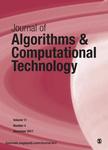版权所有:内蒙古大学图书馆 技术提供:维普资讯• 智图
内蒙古自治区呼和浩特市赛罕区大学西街235号 邮编: 010021

作者机构:Yancheng Teachers Univ Jiangsu Prov Key Construct Lab Big Data Psychol & Yancheng 224002 Peoples R China Yancheng Teachers Univ Coll Informat Engn Yancheng Peoples R China
出 版 物:《JOURNAL OF ALGORITHMS & COMPUTATIONAL TECHNOLOGY》 (J. Algorithms Comput. Technol.)
年 卷 期:2019年第13卷第13期
页 面:-页
核心收录:
学科分类:07[理学] 070102[理学-计算数学] 0701[理学-数学] 0812[工学-计算机科学与技术(可授工学、理学学位)]
基 金:National Natural Science Foundation of China [61603326, 61379064, 61273106] Jiangsu Provincial Key Constructive Laboratory for Big Data of Psychology and Cognitive Science [72591962004G]
主 题:Online sequential extreme learning machine nonstationary data streams outliers M-estimation variable forgetting factor
摘 要:Data streams online modeling and prediction is an important research direction in the field of data mining. In practical applications, data streams are often of nonstationary nature and containing outliers, hence an online learning algorithm with dynamic tracking capability as well as anti-outlier capability is urgently needed. With this in mind, this paper proposes a novel robust adaptive online sequential extreme learning machine (RA-OSELM) algorithm for the online modeling and prediction of nonstationary data streams with outliers. The RA-OSELM is developed from the famous online sequential extreme learning machine algorithm, but it uses a more robust M-estimation loss function to replace the conventional least square loss function so as to suppress the incorrect online update of the learning algorithm with respect to outliers, and hence enhances its robustness in the presence of outliers. Moreover, the RA-OSELM adopts a variable forgetting factor method to automatically track the dynamic changes of the nonstationary data streams and timely eliminate the negative impacts of the outdated data, so it tends to produce satisfying tracking results in nonstationary environments. The performances of RA-OSELM are evaluated and compared with other representative algorithms with synthetic and real data sets, and the experimental results indicate that the proposed algorithm has better adaptive tracking capability with stronger robustness than its counterparts for predicting nonstationary data streams with outliers.